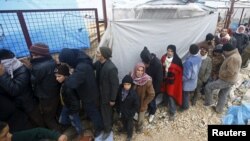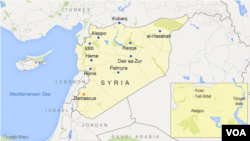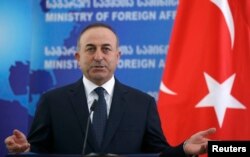Turkish officials want coalition backing to secure a strip of territory 10 kilometers deep on the Syrian side of the border around the town of Azaz to protect tens of thousands of displaced civilians, and avoid having to admit them into Turkey. Officials, however, say they are getting little support for the idea from coalition partners such as the United States.
Deputy Prime Minister Yalçın Akdoğan said Wednesday such a safe zone would also help prevent attempts to “change the demographic structure” of the area, a reference to Kurdish forces who have exploited a week-long Assad offensive to grab several villages and towns near the border with Turkey from rebel militias, including some backed by the U.S.
Turkish officials accuse the Kurdish militia, the People’s Protection Units, or YPG, of seeking a “demographic change” in northern Syria by displacing Turkmen and Sunni Arab communities. The YPG denies this, but has made little secret of its wish to unite Kurdish cantons along the border.
Turkey is coming under increasing pressure from Western governments and aid agencies to open the border and admit civilians who have fled heavy fighting in Syria's northern Aleppo countryside. Fears are mounting for civilians crowded near the border. Relief workers say there is neither enough food to go around for them nor tents.
“We keep asking the Turkish government to admit them, but we just get stonewalled,” a British official told VOA.
"What we want is to create a secure strip, including Azaz, 10 kilometers deep inside Syria and this zone should be free from clashes,” Akdoğan told AHaber television.
'Safe strip '
The proposal is a slimmed-down version of a much larger haven in northern Syria the Turks lobbied the U.S.-led coalition for last summer. Western diplomats say there is little appetite for a “safe strip” around Azaz, saying it would require coalition warplanes to patrol and protect it, something Washington has made clear it is not prepared to do for fear of being drawn into direct confrontation with both Russian and Syrian regime jets.
Akdoğan warned another 600,000 people could flee to the Turkish border. There are conflicting estimates from relief organizations and Western governments about how many displaced civilians are sheltering near the border. They range from around 50,000 to more than 100,000.
A senior Russian diplomat Wednesday also dismissed the idea of a haven and no-fly zones proposed earlier this week by German Chancellor Angela Merkel. Deputy Foreign Minister Gennady Gatilov said in remarks reported by the Interfax news agency that any no-fly zone would need to be approved by the Syrian government and endorsed by the United Nations Security Council.
But a Turkish official told VOA that there are indications Russia may support the idea of a “safe strip” at peace talks next week in Geneva. The official, who asked not to be named, said Moscow may accept the idea because it means Russia can duck the problem of what to do with tens of thousands of displaced civilians.
In an interview Wednesday with Reuters, Turkey’s foreign minister, Mevlüt Çavuşoğlu, said there is no consensus within the coalition about sending a ground force in to Syria, another key Ankara demand.
“Some countries like us, Saudi Arabia and some other western European countries have said that a ground operation is necessary ... but to expect this only from Saudi Arabia, Turkey and Qatar is neither right nor realistic," he told the Reuters news agency.
Saudi Arabia and the United Arab Emirates have said they are ready to send ground forces as part of an international coalition against the Islamic State terror group, but in concert with the United States.
U.S. officials fear such a force would be quickly drawn into the civil war raging in Syria.
“If such an operation is to take place, it has to be carried out jointly,” Çavuşoğlu added.
He said such an operation had not been seriously debated. “The coalition has not given this ground operation issue serious debate. There were opponents, and there were those who weren't going to take part but expressed a desire for Turkey or another country doing it,” he added.
Pessimism about peace talks
Çavuşoğlu held out little hope for U.N.-brokered peace talks set to resume Feb. 25 in Geneva, saying, “One needs to be realistic. While bombs are falling from the sky and people are being massacred under the pressure of the regime or are being starved, the talks cannot be very fruitful.”
The Turkish foreign minister said considerable differences remain between the U.S. and Turkey over the role Kurdish fighters are playing. On Sunday the United States called on the YPG to stop using the current circumstances to seize additional territory in the northern Aleppo countryside.
The United States has called for Turkey to display “reciprocal restraint” by ceasing shelling of YPG positions in northern Syria, according to White House officials. Turkish President Recep Tayyip Erdogan responded angrily to calls for his country to halt its cross-border shelling of Kurdish positions in Syria, saying Ankara "has no such plans." Addressing local officials Wednesday, Erdogan also said Turkey would not allow the Syrian Kurdish forces to establish a stronghold at the Syria-Turkey border.
Turkey fears the Kurds are determined to unite their canton of Afrin with the town of Kobani and further east to create a contiguous Kurdish state along its long southern border, a move that could encourage Kurdish separatists in Turkey.






